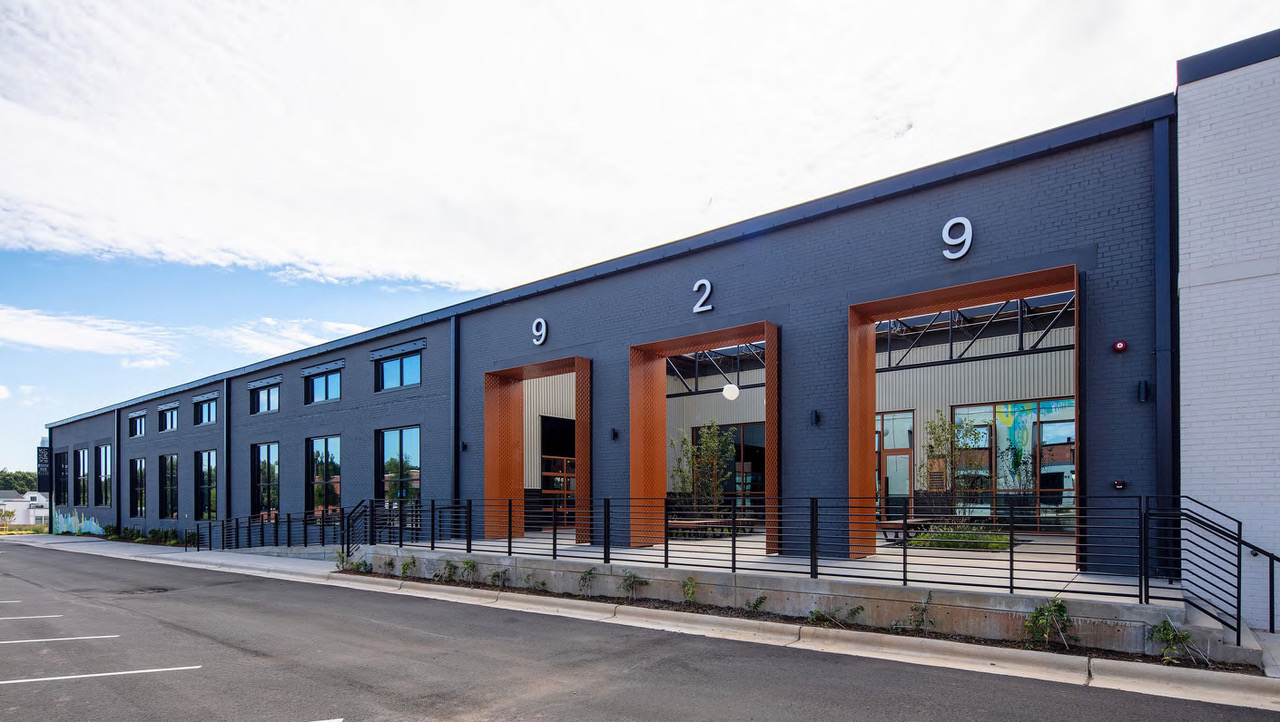Swinerton, the national general contractor, expanded into the Southeast U.S. in 2018. Since then, the firm’s Carolinas Division has generated at least $359 million in revenue from commercial construction projects that have run the gamut from corporate interiors and multifamily to healthcare and mass timber builds.
Of that total, Swinerton’s Carolinas Division is on pace to generate $120 million in revenue in 2023 alone. Among its projects nearing completion is the adaptive reuse within a former warehouse building in West Charlotte, N.C.’s Lower Tuck mixed-use development for office space: a $2.8 million renovation to create a 28,000-sf, two-story space that houses an international nonprofit disaster relief organization; and a nearly $1 million 9,000-sf expansion for an existing tenant, the tool manufacturer Positec, that adds offices, a conference room, and a break room.
These two upgrades were performed by the division’s Special Projects team. Each of Swinerton’s 20 offices nationwide has its own Special Projects crews, which allow the firm to position itself as a “community based GC” that is run like a boutique business, says Jason Hlewicki, Director of Special Projects for the Carolinas Division.
What constitutes a “special project,” however, is a little amorphous. Hlewicki says his special projects team is not separate from the division’s other employees. Nor is a project deemed “special” because of its size or cost: Hlewicki says his team has completed a renovation for a local restaurant group in 56 days, and has also worked on 100,000-sf $40 million jobs.
While special projects run across Swinerton’s practices, their designation “depends on the project’s characteristics and makeup,” he explains. Examples include commercial interiors, off-hours work, medical office building interiors, classroom renovations, and sports complexes.
Division serves a growing region
Hlewicki says that having a special projects team within a division allows Swinerton to be nimble and to pivot when needed, partly by pairing “the best possible staff with the project.” Another competitive advantage, he says, includes Swinerton being a self-performing GC whose crews are made up of its employees. (Swinerton is employee-owned.)
The Carolinas Division completes between 20 and 30 special projects annually, and therefore it deals with a lot of different AEC firms and developers. (Third & Urban is the developer of the Lower Tuck project.) it’s been Hlewicki’s experience that special projects allow Swinerton more room for creativity, especially when the firm is brought on early as part of the project’s design-build team.
The Carolinas have enjoyed a steady influx of people and businesses in recent years, a trend that’s expected to continue going forward. Hlewicki says demand for his firm’s services, both for new builds and renos, “is moving in an exciting direction.” Those services include Swinerton’s Facilities Solution program, a national platform that provides maintenance to existing clients using dedicated crews. “This keeps Swinerton top of mind with our customers,” says Hlewicki.
Related Stories
| Aug 11, 2010
PCA partners with MIT on concrete research center
MIT today announced the creation of the Concrete Sustainability Hub, a research center established at MIT in collaboration with the Portland Cement Association (PCA) and Ready Mixed Concrete (RMC) Research & Education Foundation.
| Aug 11, 2010
Study explains the financial value of green commercial buildings
Green building may be booming, especially in the Northwest, but the claims made for high-performance buildings have been slow to gain traction in the financial community. Appraisers, lenders, investors and brokers have found it difficult to confirm the value of high-performance green features and related savings. A new study of office buildings identifies how high-performance green features and systems can increase the value of commercial buildings.
| Aug 11, 2010
Architecture Billings Index drops to lowest level since June
Another stall in the recovery for the construction industry as the Architecture Billings Index (ABI) dropped to its lowest level since June. The American Institute of Architects (AIA) reported the August ABI rating was 41.7, down slightly from 43.1 in July. This score indicates a decline in demand for design services (any score above 50 indicates an increase in billings).
| Aug 11, 2010
Construction employment declined in 333 of 352 metro areas in June
Construction employment declined in all but 19 communities nationwide this June as compared to June-2008, according to a new analysis of metropolitan-area employment data released today by the Associated General Contractors of America. The analysis shows that few places in America have been spared the widespread downturn in construction employment over the past year.
| Aug 11, 2010
Jacobs, Hensel Phelps among the nation's 50 largest design-build contractors
A ranking of the Top 50 Design-Build Contractors based on Building Design+Construction's 2009 Giants 300 survey. For more Giants 300 rankings, visit http://www.BDCnetwork.com/Giants
| Aug 11, 2010
Balfour Beatty agrees to acquire Parsons Brinckerhoff for $626 million
Balfour Beatty, the international engineering, construction, investment and services group, has agreed to acquire Parsons Brinckerhoff for $626 million. Balfour Beatty executives believe the merger will be a major step forward in accomplishing a number of Balfour Beatty’s objectives, including establishing a global professional services business of scale, creating a leading position in U.S. civil infrastructure, particularly in the transportation sector, and enhancing its global reach.
| Aug 11, 2010
Construction unemployment rises to 17.1% as another 64,000 construction workers are laid off in September
The national unemployment rate for the construction industry rose to 17.1 percent as another 64,000 construction workers lost their jobs in September, according to an analysis of new employment data released today. With 80 percent of layoffs occurring in nonresidential construction, Ken Simonson, chief economist for the Associated General Contractors of America, said the decline in nonresidential construction has eclipsed housing’s problems.







